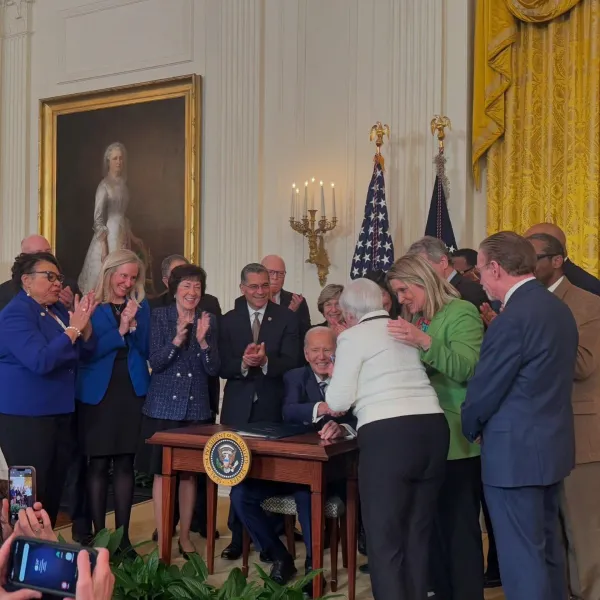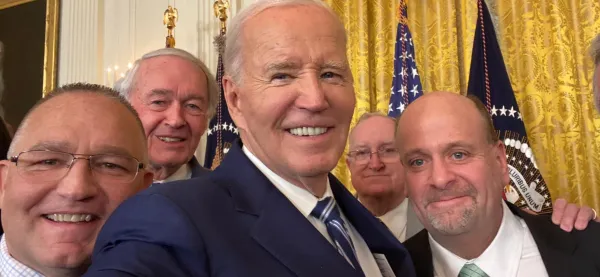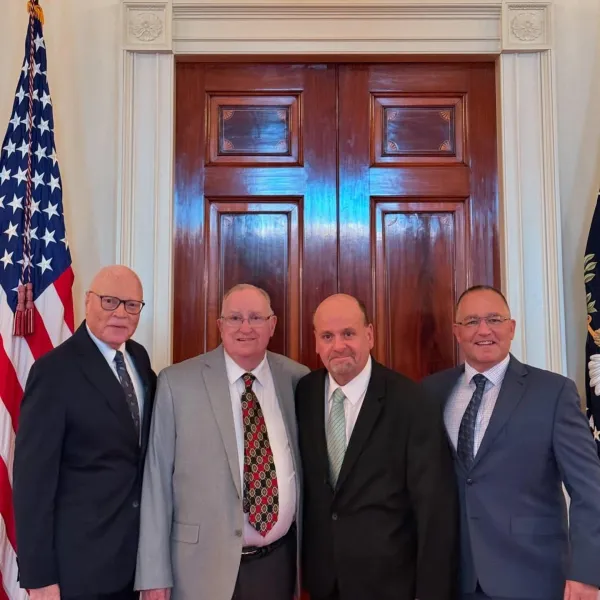They Said it Would Never Happen – They were Wrong!


Washington, DC- For the past four decades, the Social Security Administration has robbed more than $60 billion dollars in Social Security benefits from millions of men and women and their spouses simply because these workers, or their spouses, worked hard for most of their lives to earn a public pension, and despite the fact that they paid into the Social Security system at the same rate as everyone else.
This longstanding injustice finally ended on January 5th when President Biden signed the Social Security Fairness Act into law. The bill fully repealed two antiquated provisions of Social Security law that slashed both individual benefits and spousal survivor benefits if that individual or surviving spouse also received benefits from a public pension.
President Biden’s signature on the bill capped a series of stunning and inspiring acts of bi-partisanship in both branches of Congress over the past two months, where Republican and Democratic Party lawmakers joined forces to navigate through multiple complicated procedural hurdles and proposed amendments, all of which were aimed at defeating the measure.
However, in the end, proponents of the legislation prevailed. The bill cleared the House of Representatives by a margin of 327-75 on November 12th. A little over five weeks later, on December 21st, the bill passed the Senate by a margin of 76-20 on the final day of the Senate session.
“We’ve been waiting for this win for a long time, but not nearly as long as our retired members who have suffered under these provisions for decades,” said Council 93 Executive Director Mark Bernard who, along with long-serving Council 93 Retiree Chapter President Ed Keefe and the Council’s Legislative Director Jim Durkin, were at the White House to witness the historic bill signing. “While we are elated by the victory, the joy is tempered by some sadness when we think about people like Barbara Mann, who as a longtime leader within our Retiree Chapter has been fighting this battle since I was a kid and has lost hundreds of thousands of dollars over more than 30 years through both the WEP and GPO. It is extremely gratifying to finish the job she, along with Ed Keefe, started many years ago by pushing this bill across the finish line and giving people like Barbara the benefits she, and her departed husband, paid for over many years.”

“It’s hard to believe that after forty years of fighting, we have finally put an end to this injustice,” said Mann, one of the longest-serving AFSCME Retiree leaders in the country. “As someone who has worked in both the private and public sector and a widow entitled to my husband’s survivor benefits, my Social Security benefits have been slashed by thousands of dollars annually for the past several decades. I’m thrilled that I’ll finally be receiving the benefits that my husband and I paid for and earned through our contributions to Social Security, but I’m even happier for future generations of retirees who will not have to endure what I and millions of other hard-working women and men have endured for so long.”
While Council 93 had the support of every member of the House and Senate in our four-state region on the final votes, five of our United States Senators were critical in the battle to move the bill to President Biden’s desk. Maine Republican U.S. Senator Susan Collins was the original co-sponsor of the bill in the Senate and worked to build strong bi-partisan support for the legislation. She was joined in these efforts by Maine’s Independent Senator Angus King and Vermont Independent Bernie Sanders. Massachusetts Senators Ed Markey and Elizabeth Warren were crucial throughout the process, but especially in the final days and hours of the session when they aggressively pushed Senate Majority Leader Chuck Schumer to schedule a floor vote during a particularly busy and chaotic time in Congress. In addition, Senators Markey, Warren, and King kept us constantly updated through phone calls and text messages. “We owe a great deal of thanks to every legislator who voted the right way on this bill, but I believe we simply would not be where we are today without the support of these five Senators,” Bernard said.
Bernard also praised the leadership of AFSCME International President Lee Saunders and his legislative staff in Washington, DC for building support across the nation for the legislation.
“President Saunders and his team knew how important this issue was to our members, and they did a phenomenal job when we really needed them most,” Bernard said. “I’m very proud of what our national Union did and what we did at Council 93, but of course, we didn’t do it alone. So many unions and retiree organizations have worked on this issue for decades. The International Association of Firefighters, both here in New England and across the nation, our teachers and law enforcement unions, the Massachusetts and Maine AFL-CIO State Federations, I could go on and on,” Bernard said, “but none of our organizations’ leaders and staff would have been successful without the grassroots lobbying efforts of our members. I want to thank all of our active and retired members for responding to our multiple requests for them to lobby their Representatives and Senators. For those who may wonder if this work makes a difference, I think this proves that, in fact, it does!”

Under the old law, the WEP significantly reduced a worker’s Social Security benefit if the worker was also eligible to collect a public pension. The reduction happened automatically even if that worker was entitled to a Social Security benefit from work they did before they started their public-sector job, or from a second job they worked in conjunction with their public-sector job.
The Government Pension Offset (GPO) significantly reduced any survivor’s benefit a worker’s spouse may be entitled to, if the spouse received a public pension from a job not covered by Social Security - despite the fact that they were entitled to the survivor benefit based on their spouse’s past work in a Social Security covered job. Eighty-three percent of the people impacted by the GPO are women.
It’s important to note that many organizations gave up hope on full repeal years ago and in recent years began standing behind a substandard compromise bill led by Massachusetts Congressman Richard Neal. In the previous congressional session, Neal was chairman of the powerful House Ways and Means Committee. He is currently the ‘ranking’ minority party leader on the Committee. Neal’s bill offered modest improvements to the WEP, but completely ignored the GPO.
Despite the growing willingness to surrender and accept compromise, Council 93 and our Retiree Chapter refused to give up and yield any ground to politicians and advocacy organizations who were eager to put the issue behind them and claim any level of victory. “We were told we were dreamers, that it would never happen, that it was just too expensive. We heard every excuse in the book,” Bernard said of the naysayers. “It’s been a real pleasure proving people wrong.”
For decades now, the issue has been wrongfully portrayed as a problem that only impacted retired public employees in a handful of states. Led by Bernard, our union embarked on an aggressive campaign to re-frame the issue. In countless communications with members, our union correctly portrayed this as an active employee issue by reminding our members that “if we don’t fix this now, you and your spouse will be next.” The Council also started educating our brothers and sisters in private-sector unions. Focusing on the GPO, we reminded these unions that any of their members who were married to public-sector workers would see their spouses lose their survivor benefit if they pre-deceased their spouse, even though they had paid for this survivor benefit through the Social Security payroll tax. This hit home with these private sector workers, many of whom planned on providing this benefit to their wives and husbands and viewed it as the only form of ‘life insurance’ they could afford. As part of the reframing, we also noted that because the problem had been in place for 40 years, it was no longer confined to a few states. In fact, there are now people living in every state who are impacted by the WEP or GPO, or both.
After successfully implementing this new approach in the Council 93 region and seeing positive results, our union then set out to expand it to the national level. At the 2022 AFSCME International Convention in Philadelphia, Bernard joined Council 93 Retiree Chapter President Ed Keefe in filing a resolution at the convention that called on the Union to implement the same reframing of the issue on a national level. It passed unanimously. Bernard, who serves as the Northern New England District Representative on the AFSCME International Executive Board, was also quite vocal on the issue at board meetings and in conversations with national leaders and staff.
Slowly but surely, the new approach began to work not just here in the Council 93 region, but throughout the country. While there has always been at least a simple majority of support in the House for full repeal, it wasn’t until this current session that we not only reached a majority in the Senate, but surpassed a Senate majority by ten votes.
However, as time moved on, it began to seem as though the legislation would suffer the same fate as always – lots of talk, lots of co-sponsors, but no vote. Seeing this current session as our best opportunity to finish the job, Council 93 began turning up the heat on Congressman Neal. We started by stopping all political contributions to Neal from PEOPLE, our political action committee funded exclusively by voluntary contributions from members. Then in June, Council 93’s five representatives on the Massachusetts AFL-CIO Executive Board expanded the pressure on the Congressman. When it came time for endorsement votes for the state’s Congressional Delegation, Council 93’s reps successfully convinced the state federation board to table the endorsements so we could take a “wait and see” approach. We hoped to convince Neal to sign on to the full repeal legislation, and we also wanted to make sure that other members of the delegation did not fall victim to pressure and pull their support should the bill come to a floor vote. Having been burned by outgoing New Hampshire Democratic Congresswoman Ann Kuster, who pulled her support from a move to force a floor vote in the previous session, Council 93 knew all too well that our so-called friends could cave to pressure.
But when the MA AFL-CIO board met again in September, we still didn’t have a vote or a commitment from Neal, and decisions had to be made on endorsements at this final meeting before the November election. After speaking again about AFSCME’s problems with Neal on this issue and informing the full board that the five AFSCME reps would be voting against Neal’s endorsement, he failed to secure the two-thirds majority support needed, and was the only Massachusetts Congressman who was not endorsed by the AFL-CIO.
Thanks in large part to the leadership of MA AFL-CIO President Chrissy Lynch and Secretary-Treasurer Kevin Brousseau, the endorsement vote led to direct dialogue with Neal’s Washington, DC staff and Council 93. Our message to Neal’s team was simple: We will view anything short of full repeal as a loss and we will not accept any compromise. In the end, when the floor vote was held, Neal did the right thing and joined his 326 colleagues in voting yes for full repeal, sending the strongest bill possible to the Senate for consideration.
“The cooperation and support we received from Mark Bernard and his team at Council 93 was simply incredible and should serve as a model for affiliates and Retiree Chapters across the nation,” said Keefe. “The new messaging we developed and implemented together finally boiled this complicated issue down to something people could understand, and ultimately helped their Senators and Representatives understand. Most importantly, bringing active members and other unions into the fight is what made the difference. It’s my hope that every Retiree Chapter in our Union will develop the same strong relationship with their affiliates going forward.”
